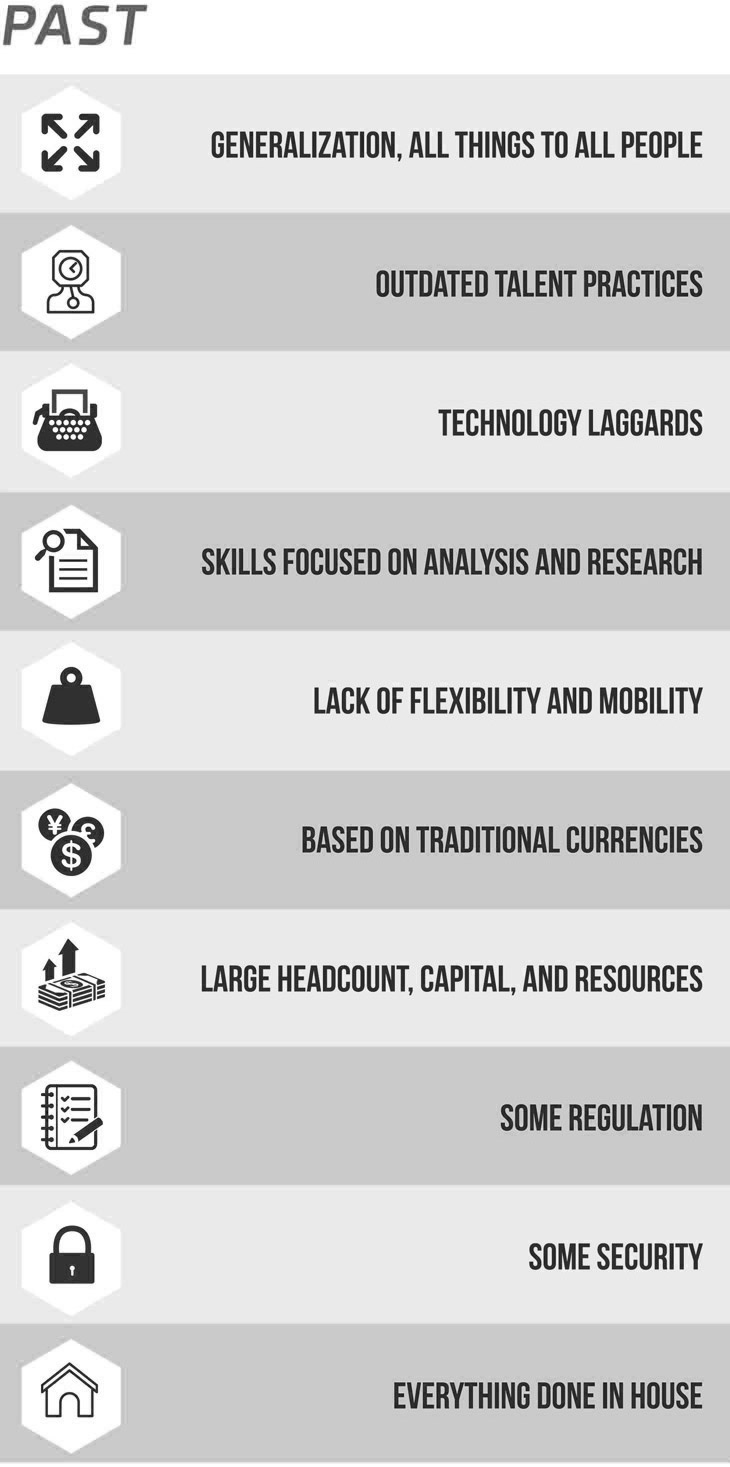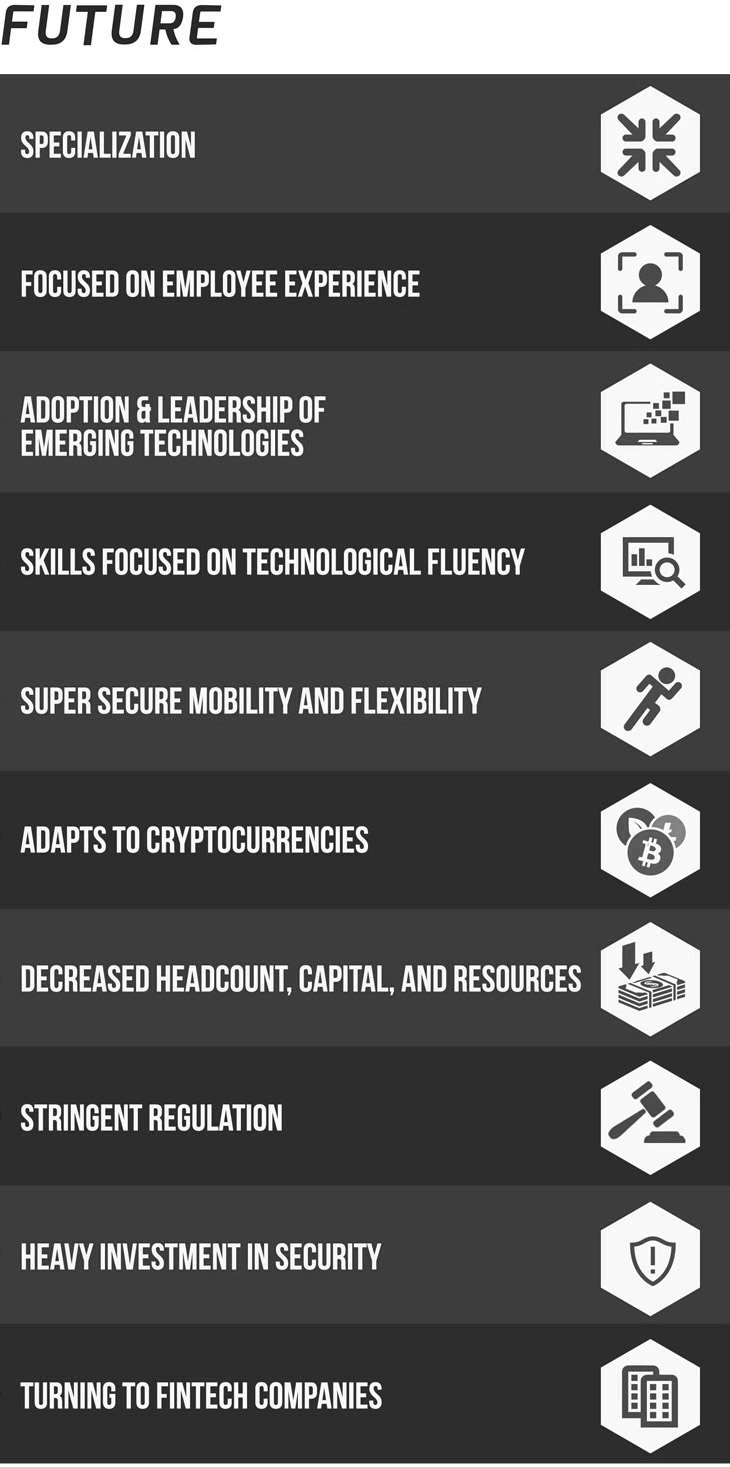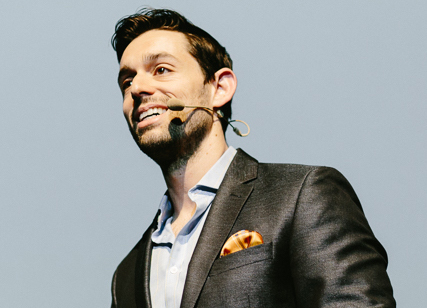By Jacob Morgan
Although we hear and read about disruption in various industries around the world, perhaps no other industry is being disrupted as much as investment banking. This once traditional industry that comprised private partnerships focused on specific markets and financial products, now has to reinvent itself. Talent wars, technology disruption, emerging fintech startups, regulation and security concerns, and new business models and structures, are creating a perfect storm for the future of investment banking. In fact, some, including MarketWatch, are questioning whether or not investment banks even have a place in our financial future.
Evolution of Investment Banks


According to data-analytics firm Coalition, the front office head count at investment banks has dropped by 21 percent over the past five years, and according to First Research, the number of U.S. brokerage firms have fallen by 25 percent since 2000. Accenture has put together a great list of the top 10 challenges that investment banks are faced with.
Although I believe that investment banks will continue to exist, at least in the foreseeable future, they are definitely changing, or perhaps more accurately, they are evolving. This is happening for several reasons.
1. Specialization
Banks must focus their efforts and resources in areas where they can make an impact.

Investment banks used to be broad general financial intuitions that could offer anything under the sun when it came to the needs of the client. The bank I go still tries to upsell and cross-sell me on anything ranging from mortgages to financial planning to getting a new credit card to investing in a college fund for my newborn daughter. It almost feels like going to a restaurant that has a 20-page menu. However, this trend is now reversing. With increased competition and the emergence of smaller FinTech startups that are challenging the large investment banks on every corner, the large financial institutions can no longer be all things to all people. According to a report published by the Boston Consulting Group, “Enormous opportunity exists from the collaboration of established capital markets players such as investment banks with young fintech companies, but the potential is far from being realized.”
They must focus their efforts and resources in the areas where they can genuinely make an impact, especially as investment banks are under greater pressure to cut costs while their revenues are declining. The one size fits all approach is no longer practical and scalable in the turbulent and rapidly changing world in which we all live and work. This level of specialization will also allow investment banks to better understand the needs of their clients.
2. Technology
Technology is perhaps the single greatest factor that is going to impact investment banking, and there are a few key areas that must be paid attention to. From the various presentations I give around the world and the executives I meet with, technology is constantly top of mind for everyone.
Digitalization through AI, big data, mobile technologies, interactive platforms, AR and VR is fast changing the way business is conducted across all financial sectors, including investment banking. In financial markets, electronic trading is becoming the dominant technology, highlighting the need for urgent reforms of investment banking IT systems and the consolidation of multiple trading platforms.
Technology is perhaps the single greatest factor that is going to impact investment banking.

Blockchain
The underlying technology behind bitcoin, blockchain, is a way of creating and validating transactions from person to person. Traditionally, any financial exchange, whether it be a cash transfer or a stock trade, has been done through an intermediary, a bank that acts as a central platform for information exchange.
According to Seamus Cushley, PwC director of FinTech and digital EMEA, the last nine months of 2016 saw 1.4 billion invested into blockchain, and according to Accenture, 90 percent of major North American and European banks are exploring blockchain. Another report from Accenture found that investment banks can save up between eight and twelve billion a year with blockchain by 2025.
Blockchain has the potential to act as this new type of middleman, except unlike a bank which is an actual entity, blockchain is a technology. This type of technology will ideally reduce commissions, increase the speed of transactions and drastically enhance security while eliminating any type of fraud. From what I have observed, the next 3-5 years will see blockchain tested in smaller applications and will likely become more mainstream and scaled closer to ten years out. For this to happen there would need to be major collaboration between the largest financial institutions, which also depends on the political and economic climate.
Blockchain represents a unique opportunity for professionals in the finance industry to get educated on a new technology that has a strong potential to transform the industry.

AI and Automation
It is likely that in the longer-term future, humans will play even less of a role in guiding financial decisions; this has been dubbed as the “robo-advisor” for both consumer and business applications. Thomas Davenport, whom I had the privilege of speaking with recently, wrote a great article for Harvard Business Review called “Wall Street Jobs Won’t Be Spared from Automation” which outlines this.
However, in the near future humans will still be quite useful and, in fact, depended upon. Before we get to the “robo-advisor” we will first have to transition to the “robo-human advisor.” That is, humans working closely with their software counterparts to make decisions, spot trends, comb through news and analyze information. Although we are making tremendous progress in areas around automation and AI, we have to remember that in order for technology to scale and make an impact, other things are required. For example, rules and regulations, developing an infrastructure, human acceptance, implementation, security and ethics, privacy and other issues all need to be explored before the “robo-advisor” becomes the de facto “employee” in all major investment banks. Humans are still useful!
In this scenario humans play a few crucial roles.
- Human security check: Putting 100 percent reliance in technology does not seem realistic or plausible in the next 3-5 years. Instead, humans will act as a type of safety mechanism to make sure that the suggestions provided by AI, algorithmic decision-making, actually make sense.
- Programming the programs: The next evolution of financial professional will be quite adept at understanding how AI works, how to customize and program it to deliver the optimal results and how to properly leverage AI for maximum benefit. Part of this means that traders, advisors and analysts will have to know how to ask AI the right questions in order to get back the best answers.
3. Super Secure Mobility
Mobility is a huge trend impacting the future of work, as many of us are all able to access information anywhere, anytime and on any device. While this may be true for individuals using popular consumer applications, this is not yet a reality for many people in hyper-regulated industries. Professionals like traders and advisors should also be able to get access to their peers, confidential information and trades, anytime and anywhere. This is currently not possible for many employees in the financial sector who are instead bound to officially sanctioned and provisioned devices that can typically only be accessed from an office location.
In addition, general concerns around overall privacy, security and cyber attacks are forcing investment banks to double down in these areas, especially with more stringent legal and regulatory requirements.
In order to break through this boundary it’s crucial to have a level of super secure mobility that complies with the latest laws and regulations. This is already starting to happen and will grow quickly over the next few years as our organizations become more distributed and dynamic.

Augmented and Virtual Reality
Financial institutions like Citi have already begun experimenting with using these technologies and there are a few great applications.
- Data visualization: Financial data is complex to look at, especially when there is a lot of it. Leveraging augmented or virtual reality can make it easier for the finance professionals to spot trends and make sense of large amounts of information
- Communication and collaboration: This goes hand in hand with data visualization. When multiple people have access to augmented and virtual reality solutions it becomes much easier to stay on the same page while making decisions.
The trader of the future will not be confined to physical space when looking at information.
- Breaking physical boundaries: A typical trader, advisor or analyst today might have access to a few computer screens with financial data. However, in the virtual world a trader can have access to as many dashboards and screens as they like. The trader of the future will not be confined to physical space when looking at information.
Early applications will continue over the coming years as traders will become more acclimated to this virtual environment.
Wearable Devices
Although the application of wearable devices is not specific to those in the finance industry, they are expected to transform the financial industry. While the future of wearable devices might see people like traders interacting with AI via voice commands and gestures, the nearer term devices are primarily used for health and wellness tracking, alerts and notifications. The main player in this space is the smartwatch and the concept which everything revolves around is the “quantified self,” that is, having access to data and insight about ourselves that can impact how we live and work. This can include stress levels, decision-making, calories burned, weight, sedentary versus active minutes during a day, quality of sleep and much more.

4. Rethinking Talent
Investment banking is what many would call a “traditional” industry that hasn’t changed much in terms of how it collectively thinks about talent and the employee experience. Employees are stereotypically overworked, treated poorly, swamped in bureaucracy and faced to deal with the daily reality of working in an environment with outdated workplace practices.



With the emergence of social media and sites like Glassdoor, these negative work experiences have been made public to the world, which creates a reduction in the overall talent pipeline for the organizations that aren’t willing to invest in their people. One of the biggest trends I see for all organizations around the world is the heavy push toward focusing on employee experience — investment banks are no exception here.
It’s also an industry that hasn’t done much over the past few years as far as innovation and embracing the “cool” factor with innovative new products, services, business models or approaches.
As virtually every company in the world becomes a technology company, the skills that were once so relevant specifically to financial institutions such as data analysis, observation and forecasting and research are now being sought after by virtually every global organization, especially in the realms of people analytics. Investment banks are no longer competing against other banks; they are competing against every other organization in every industry, including startups. In order to be able to attract and retain talent, investment banks must take a serious look at how they design their organizations to put their employees at the center.
The front office head count at investment banks has dropped by 21 percent over the past five years.
I see enormous potential for financial institutions, but opportunities are only realized when action is taken and now is the time to act. Here are some steps to take:
- Revisit your current service areas to determine where your investment bank has the legitimate potential to lead, impact and transform the market.
- Create “ears” of the organization via in-person discussions and real-time feedback technologies so that your organization can truly listen to what employees care about, value and expect.
- Keep pulse of the FinTech companies emerging in various spaces, and start discussions with them to explore potential partnership or acquisition opportunities.
- Build close relationships between HR and IT teams to combine the knowledge of people and technology to transform workplace practices.
- Create a technology lab or innovation center to experiment with the various technologies that are emerging, such as Samsung’s Knox and Mobile Device Management solutions and how they may impact the ways in which your employees work.
It should come as no shock that the changes outlined here will absolutely cause turbulence and disruption to the future of investment banking and to the banks themselves. While these institutions may not resemble their former selves, they will continue to exist at least for the foreseeable future. The financial institutions that will be able to best adapt to the emerging technology trends will see greater productivity, higher levels of innovation and overall superior business performance.
About the Author
Jacob Morgan is a best-selling author, keynote speaker, futurist, and founder of “The Future If,” a community that explores what our future can look like IF certain technologies, ideas, and trends actually happen. His latest book, The Employee Experience Advantage: How to Win the War for Talent by Giving Employees the Workspaces they Want, the Tools they Need, and a Culture They Can Celebrate” (Wiley, March 2017) analyzes over 250 global organizations to determine how to create an organization where people genuinely want, not need to show up to work. Jacob’s work has endorsed by business leaders including the CEO of Whirlpool, Global Chairman of KPMG, CEO of Cisco, CEO of Best Buy, Owner of the Golden State Warriors, CEO of Schneider Electric, and dozens of others.








